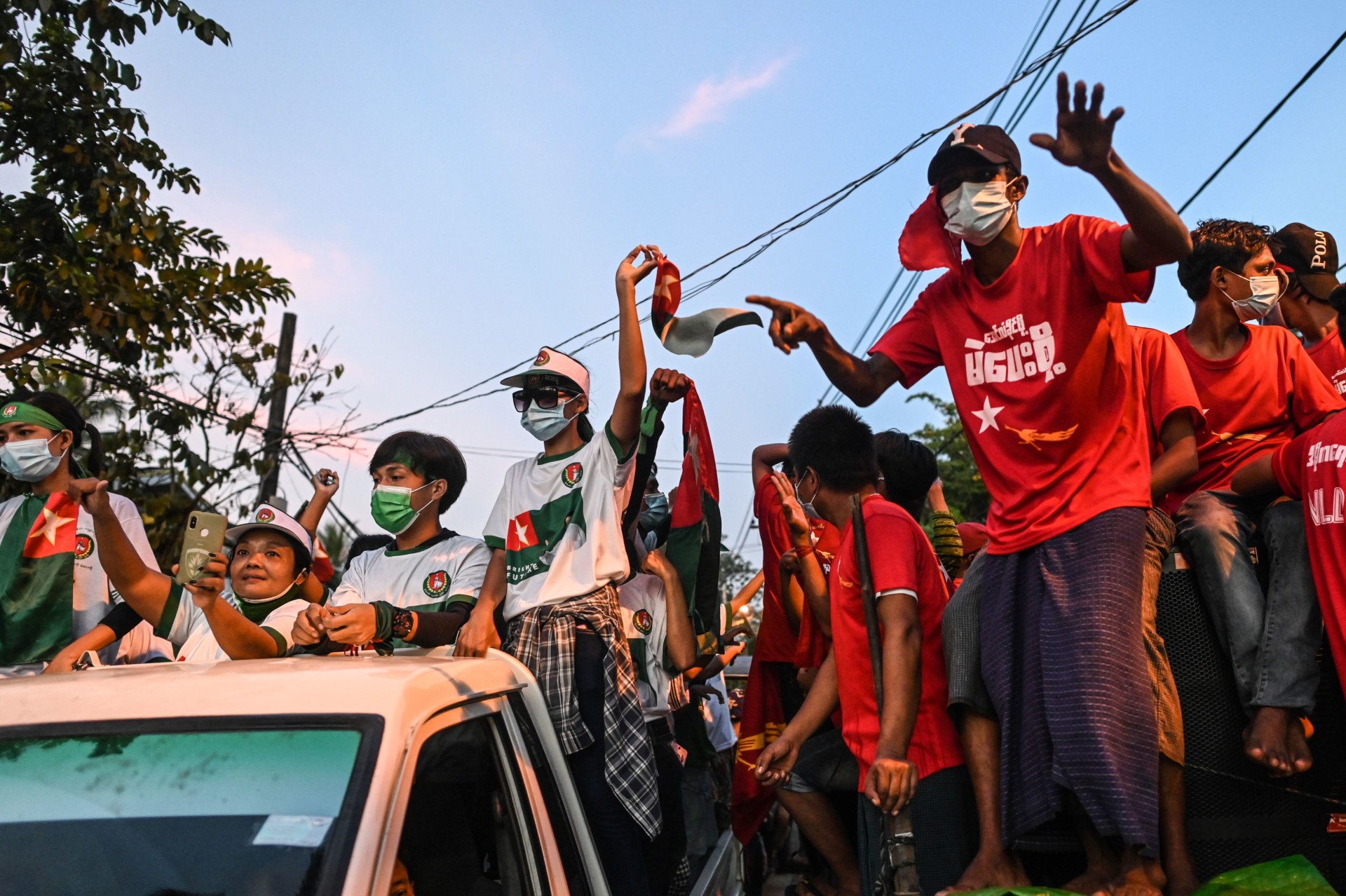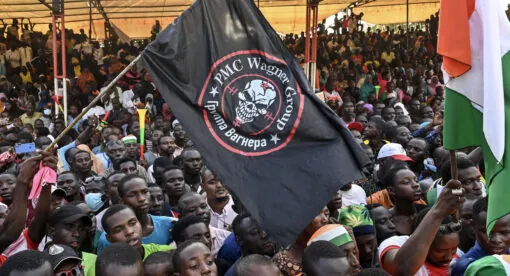Myanmar is holding a general election Nov. 8 – the third since 2010, when the military allowed for a very limited amount of space for electoral politics in the country. State Counsellor Aung San Suu Kyi’s National League for Democracy (NLD) looks set to preserve its majority in the country’s legislature. The NLD has evolved into a pro-military party, especially after it won both chambers of the national legislature in 2015. Since then, the NLD’s civilian administration has provided cover for and wars against other border ethnic groups that the military-dominated regime has been engaged in.
The NLD joining the regime has allowed the military to consolidate its authority and transform Myanmar into a false democracy. The Myanmar state is thus able to silence genuine democratic voices in civil society, the media, and the broader public who are unhappy with Naypyidaw’s increasing reliance on Beijing. In addition, the political elite has been engaged in land grabs, cronyism, and political corruption at local and federal levels. This state of affairs offers an enabling environment for China, which sees Myanmar as a key component of its geostrategic imperative to access the Bay of Bengal – a critical node in Beijing’s “String of Pearls” strategy for the Indian Ocean basin and a springboard for the Chinese to keep South Asian giant India in check.

A “Faux Democracy”
The idea of retaining the veneer of democracy to mask a de facto autocracy became increasingly popular in the mid to late 20th century. Despotic regimes across the world went through the pretense of having regular elections but ensured that only the ruling party was represented. Countries such as Cuba allowed independent candidates to stand in some elections, primarily as a means to secure legitimacy and manage dissent. Independents who proved popular would usually be co-opted into the ruling Communist Party.
Currently, a growing number of states such as Belarus and Hungary allow elections with a relatively open franchise but use the legal system to remove any real rivals, exert control over the media to deny access to public opinion, and sustain pliant opposition parties to create the illusion of plurality. Such regimes are increasingly looking to both Russia and China for support and investment to offset pressure that inevitably accompanies any potential U.S. development assistance or investment.
The minimal degree of electoral politics allowed in Myanmar’s 2008 constitution represents the operationalization of what Myanmar’s military has described as “disciplined democracy.” Accordingly, the military, which ruled the country directly for decades, reserved 25% of the seats in the new parliament for military officers or other favored nominees and ensured that the constitution permitted the military to retake power in a crisis. On top of that, the military remains sovereign over its areas of concern and maintains independent control of the Border Affairs, Home Affairs, and Defense ministries. (In Myanmar, the military leadership appoints the defense minister, not the other way around.)
That Suu Kyi’s NLD is heavily circumscribed by the military regime is understandable. However, her party has not even tried to leverage the large parliamentary majority it gained in the 2015 elections. Instead it simply has operated within the boundaries set by the military. Furthermore, economic power remains largely in the hands of the military leadership, either directly through Myanmar Economic Holdings Ltd. and the Myanmar Economic Corporation or indirectly through an extensive network of cronies whose fortunes were made through their relationships with the state during the era of direct military rule. Most of the civil service remains staffed with military loyalists.
From Opposition to Part of the System
In the five years since it gained a large majority in the federal legislature and formed the government, the NLD has been reluctant to push for a genuine civilianization of the regime. Instead, the party seems to have been entirely captured by the political system to become a willing part of what is essentially a military regime with some rudimentary trappings of democracy.
The NLD has maintained most of the controls on the media that were in force during the military junta, for example, and has gone to extreme lengths to restrict the franchise. The clearest example of this is the way the NLD government denied Rohingya Muslims the right to vote and banned ethnically Rohingya parties from even contesting the elections – in addition to overseeing the physical expulsion of nearly 1 million Rohingya to Bangladesh in 2017. Moreover, it is under the NLD government’s rule that the country has been engaged in alleged genocide and crimes against humanity during military operations that killed or displaced the vast majority of Rohingya excluded from the 2014 census.
The NLD does appear to have made some moves to create space for itself within the state. For example, the party moved the General Administration Department out of the Ministry for Home Affairs, bringing a part of the bureaucracy under nominal civilian authority. But such moves, far from being motivated by the desire to further constitutional governance, are actually designed to put power in the hands of the NLD and its backers.
While the NLD and the military have a shared interest in seriously limiting any further political reforms, the two are not allies per se. The Military-NLD partnership has created a competition of sorts between the old ruling elite and the one taking shape under Suu Kyi’s leadership. From the point of view of the military, the NLD is an extremely useful entity that helps the military to rule from behind the scenes and avoid having to shoulder the burden of governance alone. The NLD also helps the regime project – both at home and abroad – that the country is on a path toward democratization.
The NLD’s interest is in maintaining this relationship with the military. The party wants to monopolize the state’s civilian sector and keep other parties (such as the pro-military Union Solidarity and Development Party that won the 2010 elections) out of this space. The military’s interest in limiting the room for civilian actors, therefore, converges with the NLD’s desire to not have any competition from other civilian actors. There is a reason why there has not been any further opening to any other political voices since the last general election.
Thus, the NLD, contrary to its democratic rhetoric, has been co-opted by the military establishment. In essence, the NLD fundamentally retains the same kind of authoritarian impulses and, crucially, shares the same kind of exclusionary, nationalistic views about the nature of the Myanmar state that determine which ethnic groups, notably the Rohingya, are not part of the national fabric.
The leadership of the NLD no longer appears worried about the gerrymandering implicit in the military retaining 25% of the seats due to the party’s electoral dominance and broad international support. Most radical “progress” in the country has been achieved in areas where the two are in natural agreement. The most illustrative example of this is the Rohingya’s current situation – a consequence of the antipathy both sides share toward the minority group.
Western Support for Reforms in Myanmar
The United States during the Obama administration, along with the European Union, have been major supporters of Myanmar’s apparent transition to democracy. For example, since 2012, the United States has provided nearly $1.5 billion to support the country’s “democratic transition, economic transformation and advance the peace process.” And from 2017 to 2020, the European Union has given Myanmar almost 700 million euros for projects including providing “access to justice and legal aid for the poor and vulnerable.”
EU support continued despite the utter lack of progress on human rights since 2015 and the mass murder and expulsion of the Rohingya in 2018. Indeed, the European Union’s current internal documentation follows and seems to concede to some of the political choices of Myanmar’s civilian government, for example by failing to mention the Rohingya by name so as to not offend Naypyidaw and not jeopardize ongoing relations – which could be construed as a tacit endorsement of the genocide.
The United States has pulled back from its engagement with Myanmar under the Trump administration, but this was principally because Myanmar’s transition to democracy under Suu Kyi was seen as a pet project for the Obama administration and not out of any direct concern for the fate of the country’s embryonic democratization process.
But Washington should keep its attention on Myanmar – specifically the NLD’s efforts to court and gain Beijing’s support against its more isolationist-minded partners within the old military elite, a development that is making the country increasingly a satellite state of China. This is an avoidable outcome at a time when many genuinely democratic voices in the country, ordinary people and civil society actors, are unhappy with Chinese-led activity linked to environmental destruction, land grabs, and economic exploitation.
China’s Economic and Geostrategic Interests
Beijing is happy for Myanmar to retain the veneer of democracy to satisfy Western policymakers and keep development aid flowing. Meanwhile, Naypyidaw is increasingly becoming economically dependent on China. Beijing has invested in the China-Myanmar Economic Corridor – a megaproject that will connect China’s Yunnan province to the country’s economic hubs of Mandalay, Yangon New City, and the Kyaukpyu Special Economic Zone.

But more important than Beijing’s economic interests in Myanmar is the critical geostrategic role the country plays in China’s long-term ambitions. To become a global power, Beijing first must dominate its regional space, which means keeping regional competitors like in India in check. Though India lacks naval power projection capabilities in the Indian Ocean basin and does not pose a significant military threat to China, it is nevertheless a nuclear power and burgeoning economy. The Chinese would prefer not to expend energy locally and instead focus on grander ambitions farther afield.
Myanmar gives Beijing access to the Bay of Bengal region of the Indian Ocean, thus avoiding the narrow chokepoints of the Straits of Malacca. Coupled with Beijing’s significant presence in Pakistan, it has the potential to strategically surround India, with whom tensions have recently risen. A future Chinese naval base in the Bay of Bengal could also serve as a beachhead allowing Beijing to further advance its “String of Pearls” strategy in the Indian Ocean basin.

The United States, on the other hand, increasingly sees India as a bulwark against China’s regional aggressiveness and is deepening its relationship with the South Asian nation. U.S. Secretary of State Mike Pompeo and Defense Secretary Mark Esper visited New Delhi in late October to enhance military cooperation, especially with the inking of an agreement to share American geospatial intelligence with the Indians.
All things being equal, Myanmar’s Nov. 8 election should have given the United States and its allies in the European Union an opportunity to steer the country toward improved agency for civilian actors and progress toward inclusive politics in its flawed but potentially evolving democracy. These developments would have created obstacles for China’s efforts to use Myanmar as a launchpad to further threaten U.S. interests in the region. The European Union could have wielded the stick of withdrawing its ample funding, while Washington could have reinstated pre-Suu Kyi sanctions if it continued to flout human rights and democratic norms, especially on the issue of the Rohingya or the pervasive control of the domestic press.

That opportunity has passed, not least because neither Western player is paying much attention to Myanmar. That may be understandable in the current climate, but both the current COVID-19 pandemic and the election year in the United States will pass. The incipient democratic process in Myanmar represents a tool for Washington and its western allies to block Chinese moves to fully integrate Myanmar into its strategic orbit. Greater western engagement with Myanmar is also in the interest of the country’s leadership to avoid being singularly dependent upon China and at the mercy of Beijing’s long-term debt trap.
Myanmar’s leadership would welcome better relations with the West. Therefore, Washington and its allies have an opportunity to gradually facilitate political economic reforms. But more importantly, it is the way in which Washington can prevent China from dominating a country that is strategically located and could enhance Chinese strategic ambitions in South Asia.
Recommendations for U.S. Policymakers
There are a number of immediate steps that the next U.S. administration can take to gain leverage with Naypyidaw, which in turn can allow Washington to limit Beijing’s room to maneuver in the country:
- Washington should suspend the State Department’s $1.5 billion Development Assistance Program of 2012 and demand that further assistance will be contingent upon clear deliverables underscoring genuine democratic progress, such as:
- All citizens of Myanmar who are members of an ethnic group that held the equivalent of a National Registration Card in the 1980s are allowed to vote.
- Provisions are made to ensure that the major government ministries of Border, Home Affairs and Defense are bought under full civilian control.
- The United States should work with the European Union on the problems with their ongoing funding of and cooperation with Naypyidaw. Both should ensure they only fund projects in which all the people of Myanmar are included, with all political parties allowed to register and given fair access to funding and the media.
- Washington should put back on the table the sanctions and effective economic blockades that Myanmar had been subjected to before it embarked upon the path towards limited political reforms.
Engaging in these steps can help empower elements both within the NLD and the military who do not wish their country to be so heavily aligned with China. A “carrot-and-stick” approach can help force a rethink in Naypyidaw. However, Washington will need to carefully navigate the civil-military minefield in the country, as Beijing will be working hard to manipulate those who have a lot to lose from political reforms. The key will be to avoid the simplistic civil-versus-military binary, where civilians are seen as pro-Western while the generals are treated as Beijing’s allies.
The United States needs to be mindful that in an effort to advance its position within the regime the NLD has been courting China. On the other hand, the military establishment is more isolationist in its outlook and as suspicious of Chinese intentions as it is of the United States and its allies. Obviously, China has a headstart in Myanmar, and there are limits to how much the United States can serve as a substitute to China in terms of foreign assistance. But Washington can leverage Naypyidaw’s need for political stability and desire to have foreign relations options other than Beijing.
Working with both the military and the civilian administration is therefore critical to help prevent Myanmar from being a major enabler of Chinese ambitions in the Indian Ocean basin.
Dr. Azeem Ibrahim is the Director of Special Initiatives at the Newlines Institute. He is also an Adjunct Research Professor at the Strategic Studies Institute, US Army War College. Dr. Ibrahim is also author of “The Rohingyas: Inside Myanmar’s Hidden Genocide” (Hurst & OUP) and “Radical Origins: Why We Are Losing The Battle Against Islamic Extremism” (Pegasus New York). He Tweets at @AzeemIbrahim.
The views expressed in this article are those of the author and not reflective of an official policy or position of the Newlines Institute.





